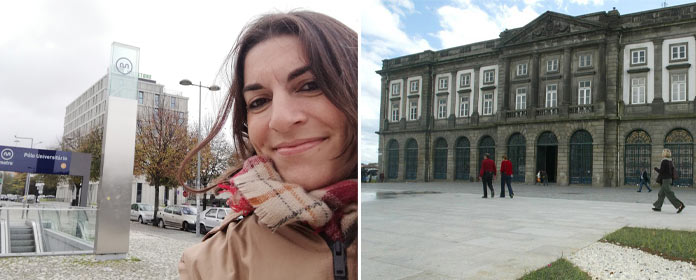"There is a kind of law, Godwin's law, which states that the further a political discussion progresses on the Internet the more likely it is that Nazism will end up being named."
Beatriz Gallardo, Professor of Linguistics at the Universitat de València, attended an international congress organized by the Institute for Culture and Society

PHOTO: Manuel Castells
"There is a kind of law, " Godwin's law", which establishes that the more a political discussion advances on the Internet, the more likely it is that Nazismwill end up being named". So says Beatriz Gallardo, who gave one of the plenary lectures of the international congress 'In the name of the people: representing the people in twenty-first century politics', organized by the Institute for Culture and Society.
She is Professor of Linguistics at the University of Valencia and has recently published a book on Public discourse and politics, "Tiempos de hipérbole", in which she analyzes the exaggerations and excesses that characterize the current Public discourse , for example in political comparisons. The author gives several examples of these comparisons, which seek victimization. "Sáez de Santamaría saying that in Catalonia apartheid is practiced, -she points out- Torra comparing the procés with the Armenian genocide or an anonymous profile on twitter saying that censorship was like Franco's garrotte vile". This does not allow to resume the axis of "rationality" to maintain a political discussion.
Another case of hyperbole pointed out by Gallardo is the magnification of the narrative underlying speech of punitive populism. It consists, according to the professor, in using a media case (for example, the so-called "Alcácer girls case") to demand a legislative change. "But the judicial speech is by definition an argumentative speech , not a narrative". He also gives as an example what many call the "narrative" of a politician or a party. "These are narratives that are functioning as argumentations," he explains. Narrative is "easier," simpler to follow, while argumentation requires several discursive lines at once.
Another case of hyperbole is the excessive attention paid to new digital technologies. "They have been received by celebrating their undeniable positive values but obviating a series of perverse effects" that seriously harm citizens, for example when they intervene in situations such as "the Brexitthe massacre of the Burmese Rohingyas and the elections in several countries". This, in his opinion, is an "irresponsibility" that occurs because of the "laziness" of politicians and voters, but also of the media.
Taking responsibility for our speechThe solution, for the author, lies, among other things, in the school, in educating citizens to live in community. "We have to educate ourselves in discrepancy, and naturalize it, nothing happens because there is disagreement," she explains. It is also important to be aware that democracy requires a distribution of power, teaching that "it is not necessarily bad to exercise power, if it is according to democratic values. Power is not in itself something bad or to be condemned.
These elements, the linguist adds, would lead citizens to "take responsibility for their words", to be consistent. As an example, she cites anonymous teacher evaluations. This contains the implicit belief that evaluations will usually be negative, that teachers will penalize those who criticize them, and that students criticize instead of speaking fairly, she reflects. "The people we teach to evaluate anonymously then do the same thing on the networks, so it is extremely important to take responsibility for our speech at all levels."
In the international congress , 'In the name of the people: representing the people in twenty-first century politics', issues such as the nationalistspeech , the speech of violence in Europe against women politicians, the speech of migration, the speech populist in Europe and other countries such as Venezuela, etc. were addressed. The activity was part of the project 'DEMOS' of the ICS, sponsored by the Ministry of Economics and Competitiveness and the European Regional Fund development .





